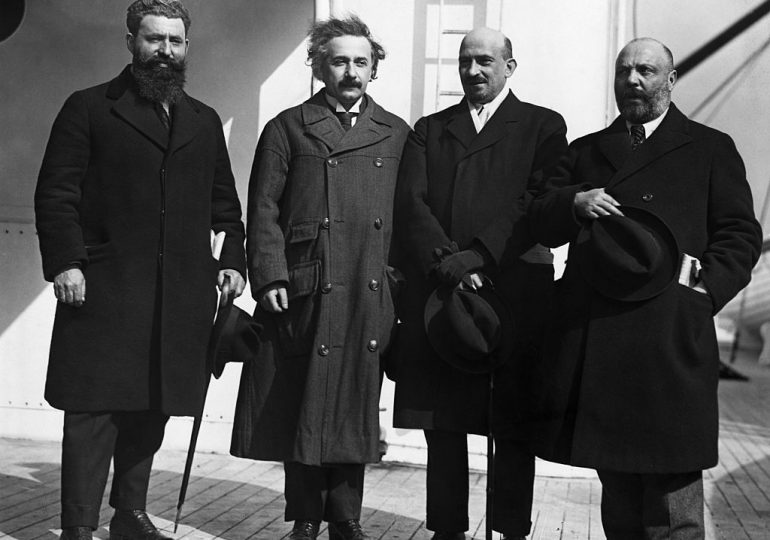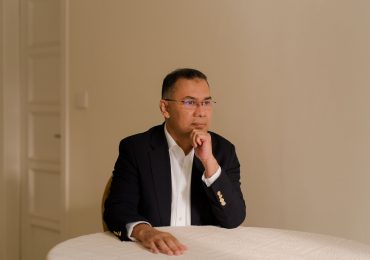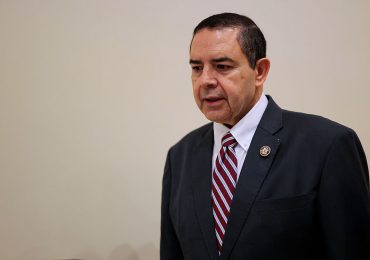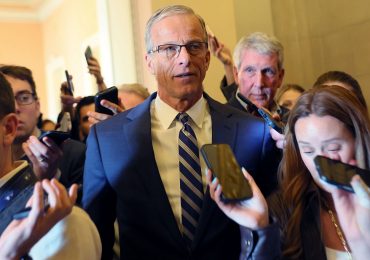Albert Einstein’s father, Hermann, was proud that Jewish rituals were not practiced in his home, viewing them as outdated, the remnants of “ancient superstition.” In Einstein’s family, just one uncle attended synagogue, and he only did so because, as he used to say, “You never know.” Yet, in 1888, when he was nine, Einstein suddenly developed a fervent Jewish faith. Of his own accord, he strictly adhered to dogma, obeying the strictures of the Sabbath and kosher dietary laws. He even composed his own hymns, which he sang on his way home from school. Meanwhile, his family carried on with their secular lives.
[time-brightcove not-tgx=”true”]
He referred to this phase of his life as a “religious paradise,” but it ended as suddenly as it had arrived. After three years, at the age of 12, he lost all interest in religion, and at the crucial moment, he refused to go ahead with his bar mitzvah and make a formal commitment to Judaism. From that moment, for the next 20 years, Einstein would deliberately distance himself from his Jewish background, claiming no religion on his official forms. In 1910, he was willing to designate himself as “Mosaic” as part of his appointment to the University of Prague, but only because to have admitted to being irreligious would have disqualified him from the job.
It was only after his arrival in Berlin in 1914 that Einstein steadily became more accepting, more pleased even, with the idea of belonging to a people. This reconfiguration of his heritage was, in large part, shaped by the many Jews he knew in the city who had tried to assimilate into German culture. Most Jews in Germany preferred this approach, which sought to “overcome anti-Semitism by dropping nearly everything Jewish,” as Einstein put it. He considered this attempt to blend in—“pussyfooting,” he called it—servile and idiotic, and was happy to say so to people’s faces.
Assimilation was more common in Western than in Eastern Europe, and Einstein especially disliked the way that in Germany many assimilated Jews viewed themselves as more refined than the mostly unassimilated Jews from countries such as Russia or Poland, and therefore superior. “It was only when, at the age of 35, I got to Berlin that I understood the Jewish community of destiny, and that I felt a duty to oppose, as far as I could, the undignified demeanor of my Jewish colleagues,” Einstein explained later in a letter to the writer Joseph Kastein.
He did not rediscover the faith that he had once held so strongly as a child. Judaism, as Einstein now conceived it, was not a question of religion. To use a metaphor he employed: a snail may be a creature that occupies a snail shell, but this does not serve as a definition; were the snail to rid itself of its shell, it would still be a snail. He conceived of Judaism, he once wrote, as a “community of tradition.” His solidarity with the Jewish people was, in his words, a solidarity with his “tribal companions” rather than religious fellows.
Read More: The Day Albert Einstein Died: A Photographer’s Story
In early 1919, it was to Zionism that Einstein turned as his way of embracing his “tribe.” Persuaded in part by the recruitment efforts of the Zionist leader Kurt Blumenfeld, Einstein overcame his instinctive objections to the nationalistic element inherent in the movement—that is, the creation of a Jewish state—and was persuaded that a Jewish home in Palestine would provide Jews with an inner security and freedom they had not yet known.
Walking home with Blumenfeld after one of the latter’s lectures, he declared, “I am against nationalism, but for the Zionist cause. The reason has become clear for me today. If a person has two arms and constantly says, ‘I have a right arm,’ then he is a chauvinist. If a person however lacks a right arm, then he must do everything to substitute for that missing limb.”
Once he had given his support, he never withdrew it. Despite not officially joining any Zionist organization, he often lent his weight in support of the movement’s goals, especially the establishment of a Jewish university in Palestine. A Jewish homeland, he believed, would provide “a center of culture for all Jews, a refuge for the most grievously oppressed, a field of action for the best among us, a unifying ideal, and a means of attaining inward health for the Jews of the whole world.”
Just as Einstein was committing to this newfound sense of Judaism and to aiding Jews in whatever way he could, so Germany was becoming more openly antisemitic. Since the First World War, in response to crushing reparations imposed by the Allies, a soothing, insidious myth had been propagated in the right-wing press: defeat had come as a result of betrayal at home. The army had been undermined by pacifist, internationalist, and anti-military sentiments on the home front: the civilian population and its leaders had denied it support at a vital moment in the war. This narrative very soon transformed into something simpler, and the blame for the country’s humiliation was placed almost entirely on the country’s Jews.
This was enough in itself to encourage Einstein to embrace and defend his Jewish feeling. His first public stand against antisemitism came in the summer of 1920, in the form of a personal defense. On August 24, a right-wing nationalistic organization, the Working Party of German Scientists for the Preservation of a Pure Science, held a rally at the Berlin Philharmonic Hall, the purpose of which was to attack the legitimacy of the theory of relativity and the character of its creator. Speaking first was Paul Weyland, an engineer who had written several politically minded articles vilifying relativity. He had latched on to the fact that the public, and some scientists, were concerned by the theory’s abstract rather than experimental basis, and the way it threatened much “traditional” science with what he saw as its “Jewish nature.” Relativity, Weyland declared at the rally, was spurious, a con for publicity, and on top of all that, it was plagiarized. The next speaker was the experimental physicist Ernst Gehrcke, who said effectively the same thing as Weyland, but in scientific language.
Halfway through his speech, a whisper rolled around the hall—“Einstein,” the listeners were saying. “Einstein, Einstein.” Albert was sitting in one of the boxes for all to see, there to watch the show and mock it in the open. Although he was truthfully enraged by his detractors and their blatant prejudice—and would respond to the meeting a few days later with an article attacking them and refuting their arguments—for now Einstein was all smiles and calm. Along with his friend Walther Nernst, he punctuated the proceedings with loud rounds of laughter and applause. When all was finished, he pronounced the meeting “most amusing.”
Such public stands as this, of course, increased the hatred that the German Right had for Einstein. Over the next decade, Einstein repeatedly stood up against the slow turn to authoritarianism. During the run-up to the Reichstag elections of 1932—the results of which made the Nazis the largest party in the government—Einstein co-wrote a manifesto warning that the country was in danger of becoming a fascist society. His wife Elsa implored him not to sign any more political appeals. “If I were as you want to have me,” he replied, “then I just wouldn’t be Albert Einstein.” Eager to humiliate the famous, Jewish scientist, after they had come to power, the Nazis formally stripped Einstein of his German citizenship in April 1934—at which time he was working at the Institute for Advanced Study in Princeton.
Read More: The Real Lesson of the Racial Slurs in Albert Einstein’s Private Travel Diaries
Shortly before this occurred, the United States Congress introduced a joint resolution to naturalize him. Their reasons for doing so, as set out in the resolution, were that Einstein was accepted as a “savant and genius,” that he was an esteemed humanitarian, that he had publicly professed his love of the US and its Constitution, and that, above all, America was known throughout the world as a “haven of liberty and true civilization.” Einstein declined the offer. In fact, he was saddened and embarrassed by it. He only wished to be treated like any other new immigrant to the U.S., without honors and benefits. So when Albert decided to make Princeton his permanent home, he set about applying for American citizenship along the normal routes. As Einstein was still a Swiss citizen, it was not a lawful necessity for him to do this, but it was something he wanted to do.
The immigration visa Einstein needed could only be filed from a U.S. embassy, the nearest of which happened to be in Bermuda. Therefore, in May 1935, he and his family sailed to the island for a few days, in what was to be his last trip outside the U.S. While there, Einstein didn’t do a brilliant job at filling out his forms. In his Declaration of Intention he managed to get both the month and year of his and Elsa’s wedding completely wrong. He made mistakes regarding where and when she was born and was also wrong about both of his sons’ birthdays. His application was processed despite these errors, and five years later he took his citizenship test in Trenton, New Jersey.
As part of this process, he agreed to be interviewed after his exam for the immigration service’s radio program I Am an American. In the course of this, he argued that, to secure a future without wars, all nations, including America, would have to surrender part of their sovereignty to a global organization that would have complete control of all of its members’ military power.
Along with 88 others, he was sworn in on October 1, 1940. To the reporters covering the event, he praised his new country. America, he said, would prove that democracy is not just a system of government, but “a way of life tied to a great tradition, the tradition of moral strength.” Einstein was to live for 15 years as an American, and although he never lost hope for his adoptive country, he became increasingly concerned by the rise of wild anti-Communist feeling after the end of the Second World War. He saw, especially in Joseph McCarthy’s maniacal security investigations, something recognizable to him. “The German calamity of years ago repeats itself,” he lamented in 1951. “People acquiesce without resistance and align themselves with the forces of evil.”
Einstein’s commitment to the Zionist cause did not waver in his later years. Indeed, in the very days before his death in 1955, Einstein was writing a speech for radio to celebrate Israeli Independence Day. In discussing its contents with the American Israeli Ambassador, he explained that he was worried about how the Jews were struggling to live with the Arabs. He believed that how they were to treat Arabs would prove to be the true moral test of the Jewish people. He worked on it as he lay in hospital, dying—but he was never to deliver it. A draft lay by the side of his deathbed. “I speak to you today,” it began, “not as an American citizen and not as a Jew, but as a human being …”
Leave a comment
















